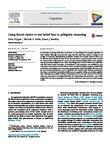Using forced choice to test belief bias in syllogistic reasoning
| dc.contributor.author | Trippas, D | |
| dc.contributor.author | Verde, Michael | |
| dc.contributor.author | Handley, SJ | |
| dc.date.accessioned | 2017-09-15T14:06:08Z | |
| dc.date.available | 2017-09-15T14:06:08Z | |
| dc.date.issued | 2014-12 | |
| dc.identifier.issn | 0010-0277 | |
| dc.identifier.issn | 1873-7838 | |
| dc.identifier.uri | http://hdl.handle.net/10026.1/9936 | |
| dc.description.abstract |
In deductive reasoning, believable conclusions are more likely to be accepted regardless of their validity. Although many theories argue that this belief bias reflects a change in the quality of reasoning, distinguishing qualitative changes from simple response biases can be difficult (Dube, Rotello, & Heit, 2010). We introduced a novel procedure that controls for response bias. In Experiments 1 and 2, the task required judging which of two simultaneously presented syllogisms was valid. Surprisingly, there was no evidence for belief bias with this forced choice procedure. In Experiment 3, the procedure was modified so that only one set of premises was viewable at a time. An effect of beliefs emerged: unbelievable conclusions were judged more accurately, supporting the claim that beliefs affect the quality of reasoning. Experiments 4 and 5 replicated and extended this finding, showing that the effect was mediated by individual differences in cognitive ability and analytic cognitive style. Although the positive findings of Experiments 3-5 are most relevant to the debate about the mechanisms underlying belief bias, the null findings of Experiments 1 and 2 offer insight into how the presentation of an argument influences the manner in which people reason. | |
| dc.format.extent | 586-600 | |
| dc.format.medium | Print-Electronic | |
| dc.language | en | |
| dc.language.iso | eng | |
| dc.publisher | Elsevier BV | |
| dc.subject | Belief bias | |
| dc.subject | Signal detection theory | |
| dc.subject | Forced choice | |
| dc.subject | Individual differences | |
| dc.title | Using forced choice to test belief bias in syllogistic reasoning | |
| dc.type | journal-article | |
| dc.type | Journal Article | |
| dc.type | Randomized Controlled Trial | |
| plymouth.author-url | https://www.webofscience.com/api/gateway?GWVersion=2&SrcApp=PARTNER_APP&SrcAuth=LinksAMR&KeyUT=WOS:000345481300006&DestLinkType=FullRecord&DestApp=ALL_WOS&UsrCustomerID=11bb513d99f797142bcfeffcc58ea008 | |
| plymouth.issue | 3 | |
| plymouth.volume | 133 | |
| plymouth.publication-status | Published | |
| plymouth.journal | Cognition | |
| dc.identifier.doi | 10.1016/j.cognition.2014.08.009 | |
| plymouth.organisational-group | /Plymouth | |
| plymouth.organisational-group | /Plymouth/Faculty of Health | |
| plymouth.organisational-group | /Plymouth/Faculty of Health/School of Psychology | |
| plymouth.organisational-group | /Plymouth/REF 2021 Researchers by UoA | |
| plymouth.organisational-group | /Plymouth/REF 2021 Researchers by UoA/UoA04 Psychology, Psychiatry and Neuroscience | |
| plymouth.organisational-group | /Plymouth/REF 2021 Researchers by UoA/UoA04 Psychology, Psychiatry and Neuroscience/UoA04 Psychology, Psychiatry and Neuroscience MANUAL | |
| plymouth.organisational-group | /Plymouth/Research Groups | |
| plymouth.organisational-group | /Plymouth/Research Groups/Centre for Brain, Cognition and Behaviour (CBCB) | |
| plymouth.organisational-group | /Plymouth/Research Groups/Centre for Brain, Cognition and Behaviour (CBCB)/Cognition | |
| plymouth.organisational-group | /Plymouth/Users by role | |
| plymouth.organisational-group | /Plymouth/Users by role/Academics | |
| dc.publisher.place | Netherlands | |
| dcterms.dateAccepted | 2014-08-14 | |
| dc.identifier.eissn | 1873-7838 | |
| dc.rights.embargoperiod | Not known | |
| rioxxterms.versionofrecord | 10.1016/j.cognition.2014.08.009 | |
| rioxxterms.licenseref.uri | http://www.rioxx.net/licenses/all-rights-reserved | |
| rioxxterms.licenseref.startdate | 2014-12 | |
| rioxxterms.type | Journal Article/Review |


